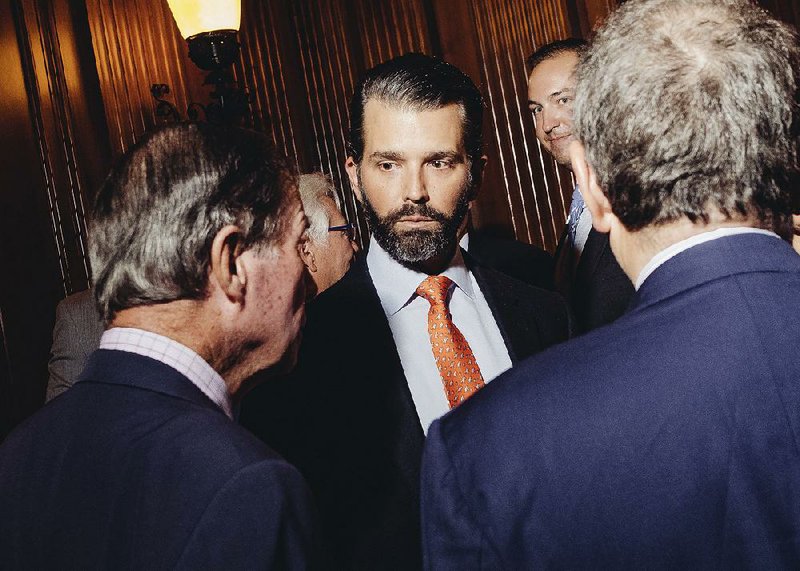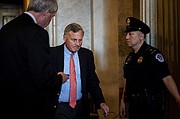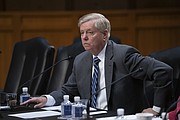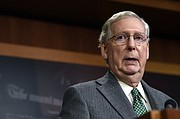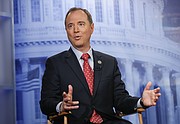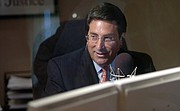WASHINGTON -- Donald Trump Jr. and the Republican-controlled Senate Intelligence Committee reached a deal Tuesday for the president's eldest son to sit for a private interview with senators in the coming weeks.
The deal came after a push by the younger Trump's allies, who accused the Intelligence Committee's chairman, Sen. Richard Burr, R-N.C., of caving to Democrats by issuing a subpoena for the president's son's testimony. They called the effort a political hit job against the White House, using the president's son as fodder.
Burr told fellow Republican senators last week that the president's son had twice agreed to voluntary interviews but had not shown up, forcing the subpoena.
The president's lawyer had prepared a letter to send to the committee, telling its members that Trump Jr. would not submit to open-ended questions before a panel that included multiple Democrats running for president, according to people familiar with its contents. The lawyers had prepared to send the letter Monday, facing a deadline to respond to the subpoena.
But they received a call from committee aides, asking if there was a "reasonable" path forward, according to a person familiar with the events.
The compromise was an appearance by Trump Jr. in the middle of June for up to four hours, with questions limited to about a half-dozen topics, according to people familiar with the agreement. The people spoke on condition of anonymity Tuesday to discuss the confidential terms.
Another person, who would not be identified, contested that the scope of the topics had been limited.
A spokesman for Burr declined to comment.
Alan Futerfas, a lawyer for Trump Jr., also declined to comment.
The agreement provides Burr with an off-ramp from the confrontation. If the younger Trump had refused to appear, the chairman would have faced a choice between initiating contempt of Congress proceedings against the president's eldest son and undercutting the independence of his two-year investigation of Russian election interference by letting Trump Jr. defy him.
President Donald Trump questioned why his son would be subpoenaed after the special counsel, Robert Mueller, had been unable to prove a conspiracy between his campaign and Russia. Though the president has pushed back against Democratic inquiries in the House, he had largely left the Senate Intelligence Committee's investigation to proceed with minimal attention.
Asked about the subpoena Monday, the president said he viewed it as unfair.
"It's really a tough situation because my son spent, I guess, over 20 hours testifying about something that Mueller said was 100% OK," he told reporters at the White House. "And now they want him to testify again. I don't know why. I have no idea why, but it seems very unfair to me."
Burr had not commented publicly on the standoff. Privately, though, he suggested to colleagues last week that the subpoena was of the younger Trump's own making.
He told Republican Senate colleagues at a private lunch that Trump Jr. had twice agreed -- once in March and once in April -- to return to the committee for a voluntary interview, only to later back out. It was only after he asked to postpone again in April that the committee authorized a subpoena to compel his appearance, Burr said.
People close to Trump Jr. say his position on the committee's request had changed after the release of Mueller's report last month. The report indicated that Mueller's investigators had considered charging the younger Trump in connection with a June 2016 meeting in Trump Tower with a Russian lawyer promising "dirt" on Hillary Clinton. They ultimately decided against it.
Senate investigators are interested in asking the younger Trump about that meeting as well as his knowledge of a proposed Trump Tower project in Moscow.
Trump Jr. sat for an interview with committee investigators in 2017, and has met with a handful of other congressional committees for dozens of hours.
Earlier, some Republicans said they thought Trump Jr. shouldn't comply with the subpoena.
Sen. Thom Tillis, R-N.C., tweeted, "It's time to move on & start focusing on issues that matter to Americans." Sen. Ted Cruz, R-Texas, said there was "no need" for the subpoena.
Senate Judiciary Committee Chairman Lindsey Graham, R-S.C., said on Fox News Sunday that if he were Trump Jr.'s lawyer, "I would tell him, 'You don't need to go back into this environment anymore.'"
Senate Majority Leader Mitch McConnell has defended Burr, telling his colleagues during the private GOP luncheon last week that he trusted the intelligence committee chairman. On Tuesday, McConnell told reporters that "none of us tell Chairman Burr how to run his committee."
Still, McConnell made clear that he is eager to be finished with the probe, which has now gone on for more than two years.
Burr has "indicated publicly he believes they will find no collusion" with Russia, McConnell said. "We're hoping we will get a report on that subject sometime soon."
SUBPOENA THREATS
The deal between Trump Jr. and the Senate Intelligence Committee comes as the House Intelligence Committee is threatening to subpoena four lawyers for the president, his children and his businesses to determine whether they or others directed Michael Cohen to lie to lawmakers about the president's efforts to build a tower in Russia during the 2016 campaign.
Rep. Adam Schiff, D-Calif., reached out to the lawyers in March, shortly after Cohen, Trump's former attorney, told lawmakers during congressional hearings that the president's lawyers had helped edit his 2017 testimony, in which he said the president relinquished his plans to build a Trump Tower in Moscow months earlier than he did.
Cohen also told members of the House Intelligence Committee that he had discussed the possibility of a pardon with representatives of the president, including his lawyer, Jay Sekulow, who denied the assertion at the time.
Sekulow is one of the four lawyers who now faces the threat of a subpoena after failing to produce documents and schedule interviews with the Intelligence panel before last Friday, according to a committee aide -- a deadline Schiff imposed in a letter sent to the lawyers' representatives earlier this month.
The other lawyers whose records and testimony are being pursued are Abbe Lowell, a lawyer for Trump's daughter Ivanka Trump and her husband, senior White House adviser Jared Kushner; Futerfas; and Alan Garten, who represents the Trump Organization.
The quartet of counsels pushed back against the committee's request in an April letter in which their attorneys claimed, among other things, that the committee's request is without legislative merit and that their actions would be covered by attorney-client privilege.
The Washington Post obtained a copy of the correspondence, the existence of which was first reported by The New York Times.
On Tuesday, Patrick Strawbridge, a lawyer for Sekulow, released a statement on behalf of the group, accusing Schiff of fomenting a "truly needless dispute."
"Instead of addressing important intelligence needs, the House Intelligence Committee appears to seek a truly needless dispute -- this one with private attorneys -- that would force them to violate privileges and ethical rules," Strawbridge wrote. "As committed defense lawyers, we will respect the constitution and defend the attorney-client privilege -- one of the oldest and most sacred privileges in the law."
Schiff defended the inquiry Tuesday, arguing that materials the Intelligence Committee has collected, as well as Cohen's testimony to the panel and Mueller "raise serious, unresolved concerns about the obstruction of our Committee's investigation that we would be negligent not to pursue."
"The Mueller Report revealed a widespread, coordinated effort by the President and his surrogates to obstruct the Special Counsel's investigation," Schiff continued in a statement. "We must determine how expansive the obstruction effort was, and whether others were involved beyond those who were indicted."
Schiff's request seeks information about the contacts between Cohen, Trump, representatives of the Trump organization and any Russians related to the Trump Tower Moscow project -- including details about its timeline and any plans to have Trump, then a presidential candidate, travel to Russia to help it along.
It also seeks details on any discussion about any pardon or "pardon-related concept" that was discussed for Cohen or other affiliates of the president who testified to the House Intelligence Committee, as well as the edits made to Cohen's testimony.
Cohen is now serving a three-year prison sentence for lying to lawmakers, as well as financial crimes.
Information for this article was contributed by Maggie Haberman and Nicholas Fandos of The New York Times; by Mary Clare Jalonick, Jonathan Lemire and Lisa Mascaro of The Associated Press; and by Karoun Demirjian, Ashley Parker, Tom Hamburger and Carol D. Leonnig of The Washington Post.
A Section on 05/15/2019
